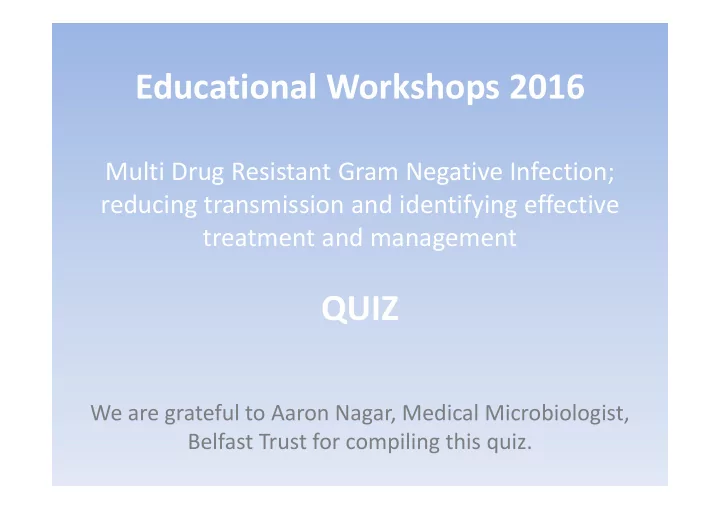

Educational Workshops 2016 Multi Drug Resistant Gram Negative Infection; reducing transmission and identifying effective treatment and management QUIZ We are grateful to Aaron Nagar, Medical Microbiologist, Belfast Trust for compiling this quiz.
When was carbapenem resistance in Klebsiella pneumoniae first reported? a) 1983 b) 1994 c) 1999 d) 2001 e) 2008
When was carbapenem resistance in Klebsiella pneumoniae first reported? a) 1983 – First ESBL reported b) 1994 – Ambler Class B metalloenzyme, Japan c) 1999 – First IMP in KP, Japan d) 2001 – First KPC, US and first OXA ‐ 48, Turkey e) 2008 – First NDM, Sweden
What proportion of invasive Klebsiella pneumoniae isolates in UK were resistant to carbapenems in 2014? a) 0% b) 0.8% c) 1.8% d) 2.3% e) 5.0%
What proportion of invasive Klebsiella pneumoniae isolates in UK were resistant to carbapenems in 2014? a) 0% (Estonia, Finland, Norway, Sweden) b) 0.8% c) 1.8% (Portugal) d) 2.3% (Spain) e) 5.0% (Cyprus) Greece ‐ 62.3%
What proportion of invasive E. coli isolates in UK were resistant to 3 rd generation cephalosporins in 2014? a) 3.3% b) 5.6% c) 10.3% d) 12.3% e) 21.0%
What proportion of invasive E. coli isolates in UK were resistant to 3 rd generation cephalosporins in 2014? a) 3.3% (Iceland) b) 5.6% (Sweden) c) 10.3% d) 12.3% (Spain) e) 21.0% (Greece) Bulgaria – 40.4%
What was the first carbapenem introduced into clinical practice? When? Clue
What was the first carbapenem introduced into clinical practice? When? Imipenem, 1985 First carbapenem was thienamycin, isolated from Streptomyces cattleya – reported at ICAAC in 1976 Unstable in aqueous solution
The "V" in VIM carbapenemase stands for which city? a) Valencia b) Verona c) Venice d) Vladivostok e) Vienna
The "V" in VIM carbapenemase stands for which city? a) Valencia b) Verona c) Venice d) Vladivostok e) Vienna
Which one of the following is the odd one out? a) Serratia marcescens b) Stenotrophamonas maltophila c) Elizabethkingia meningoseptica d) Aeromonas sp.
Which one of the following is the odd one out? a) Serratia marcescens b) Stenotrophamonas maltophila c) Elizabethkingia meningoseptica d) Aeromonas sp. The other organisms have an intrinsic carbapenemase.
According to the "Review on Antimicrobial Resistance" chaired Jim O'Neill, by 2050 the death toll due to antimicrobial resistance could be a) 10 million people per year b) 1 million people per year c) 1 billion people per year d) 25 million people per year e) 5.7 million people per year
According to the "Review on Antimicrobial Resistance" chaired Jim O'Neill, by 2050 the death toll due to antimicrobial resistance could be a) 10 million people per year b) 1 million people per year c) 1 billion people per year d) 25 million people per year e) 5.7 million people per year
Which of the following is the odd one out? a) IMI/NMC b) VIM c) OXA ‐ 48 d) IMP e) SHV ‐ 1
Which of the following is the odd one out? a) IMI/NMC b) VIM c) OXA ‐ 48 d) IMP e) SHV ‐ 1 The rest are carbapenemases
Recommend
More recommend